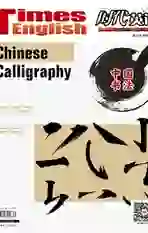Unit 3Could you please tell me where the restrooms are?
2024-09-05
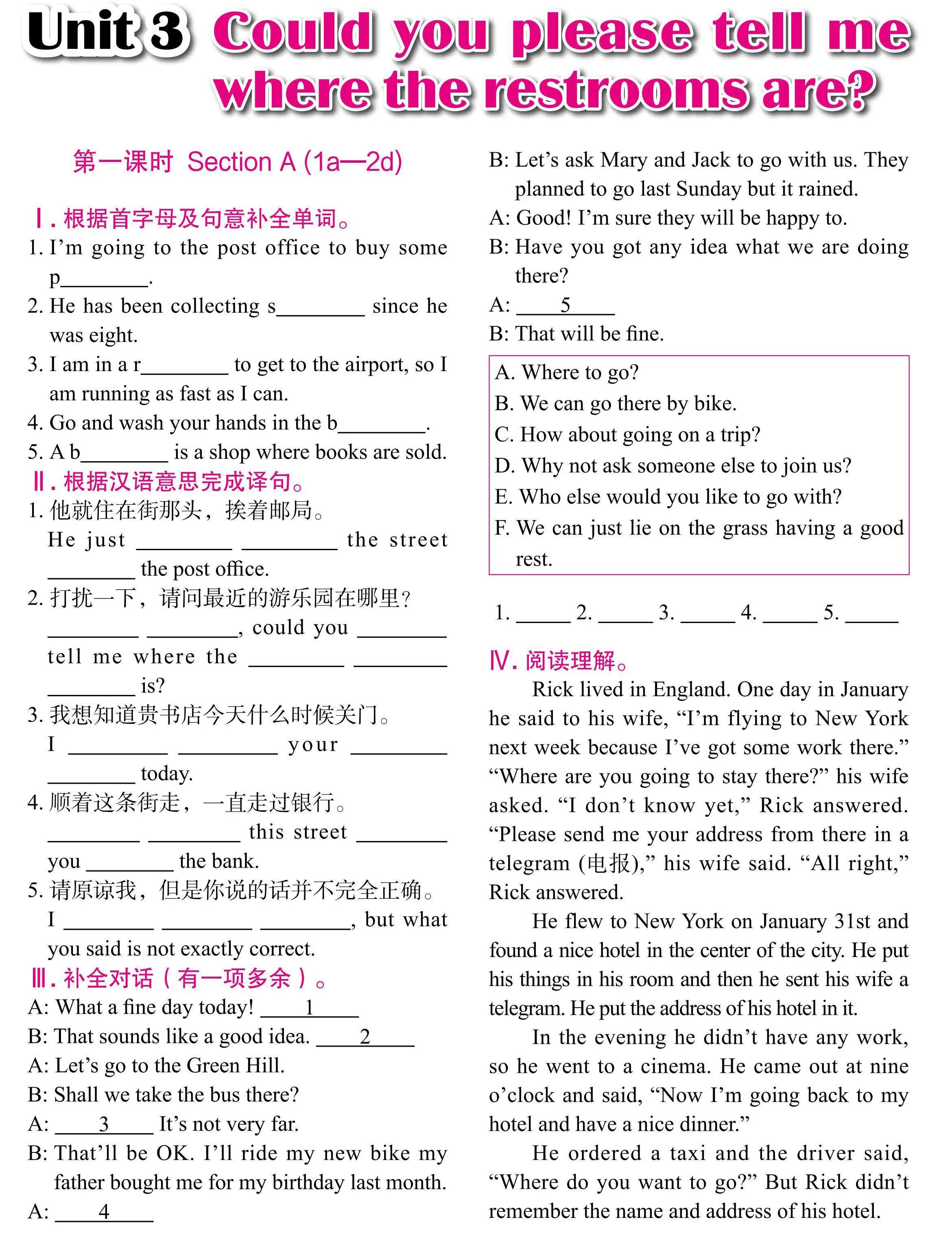
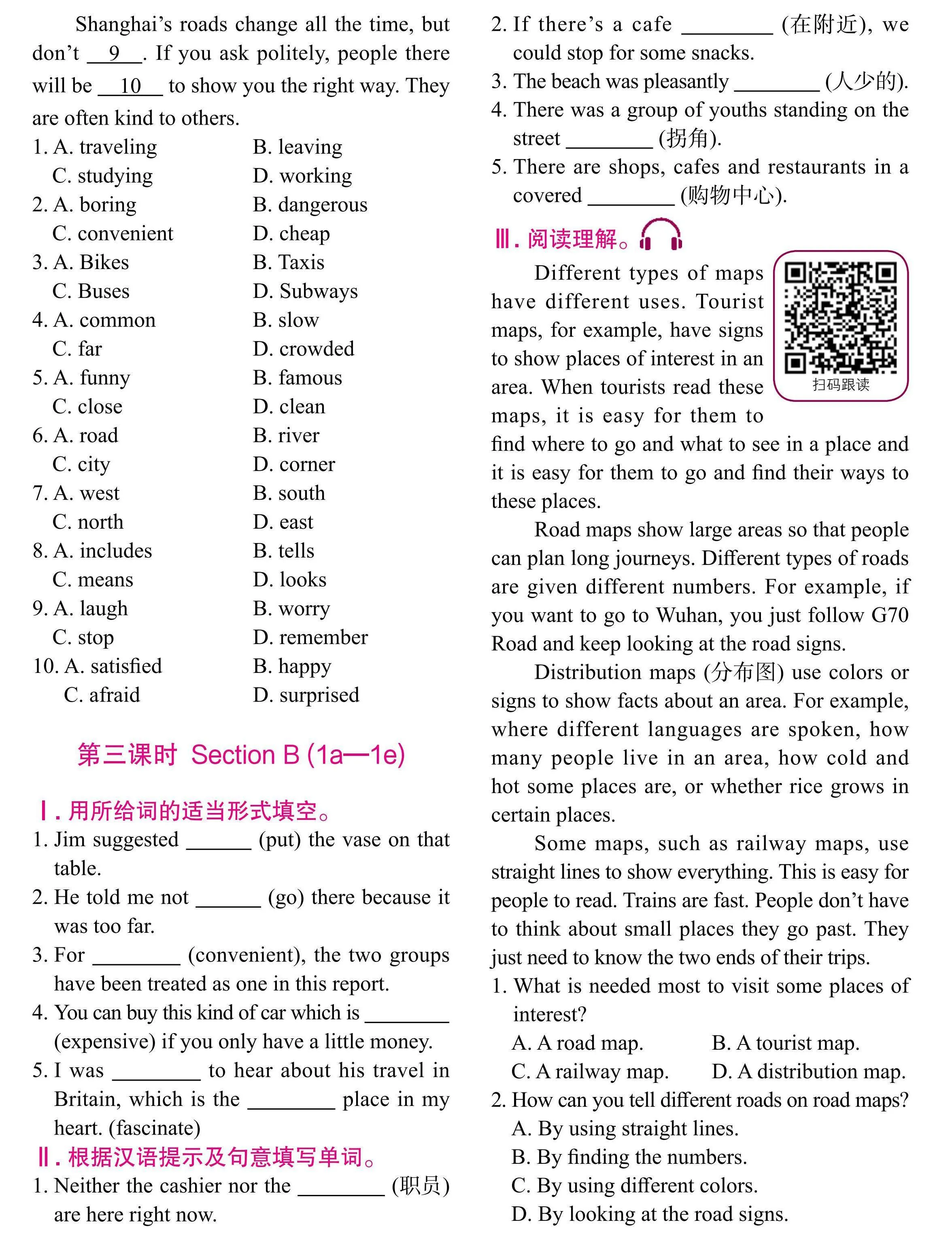
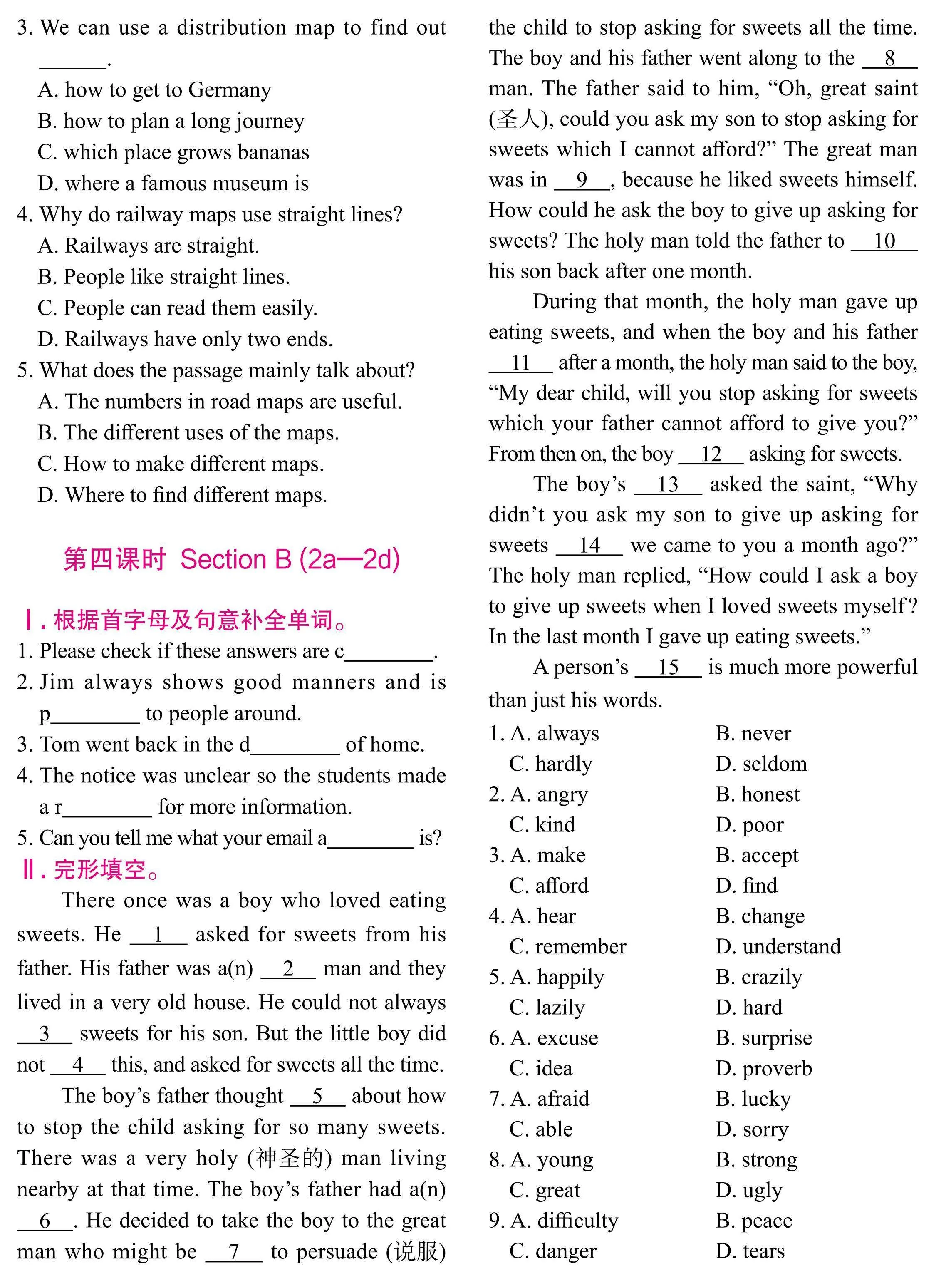
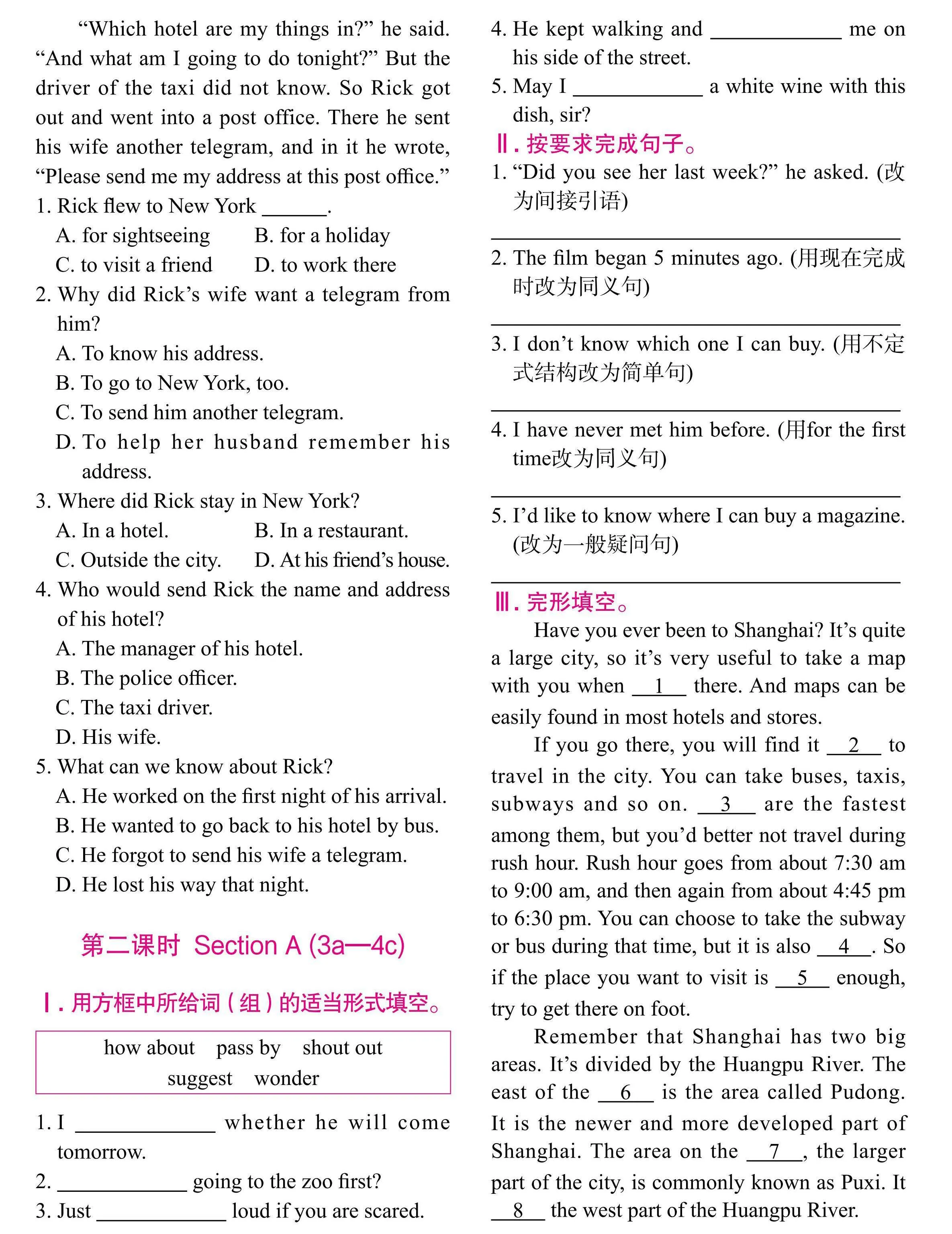
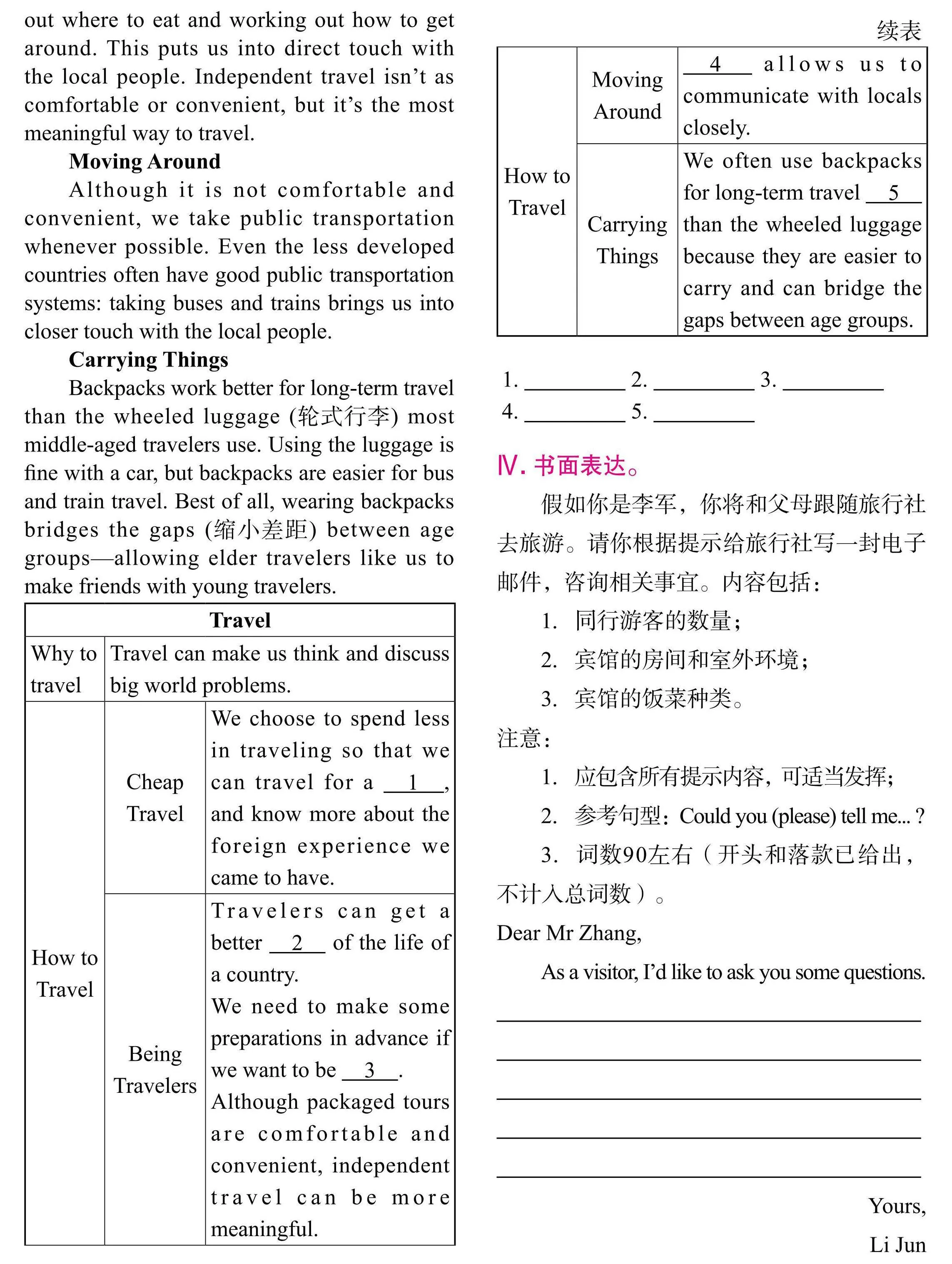
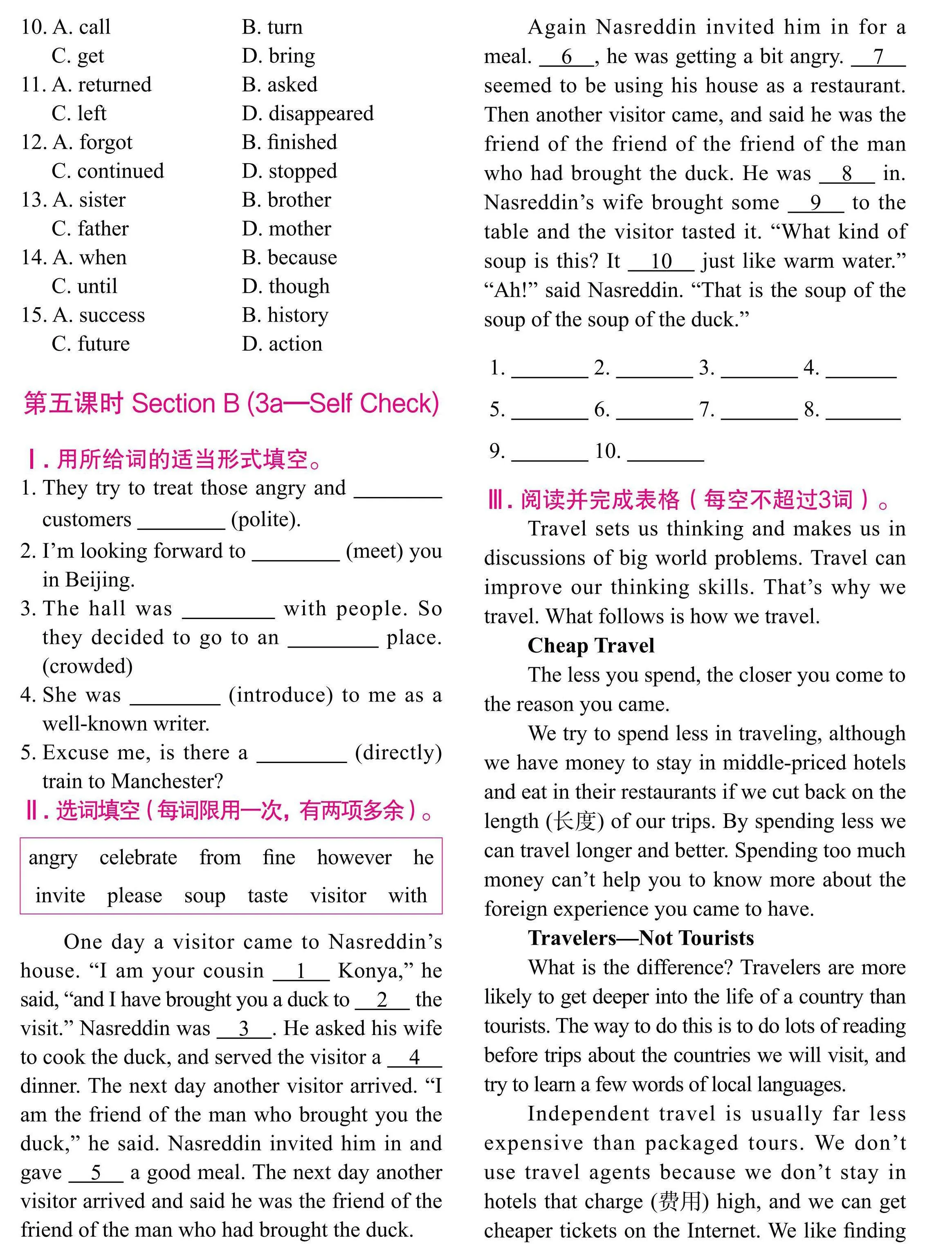
第一课时 Section A (1a—2d)
Ⅰ. 根据首字母及句意补全单词。
1.I’m going to the post office to buy some
p .
2.He has been collecting s since he was eight.
3.I am in a r to get to the airport, so I am running as fast as I can.
4.Go and wash your hands in the b .
5.A b is a shop where books are sold.
Ⅱ. 根据汉语意思完成译句。
1. 他就住在街那头,挨着邮局。
He just the street
the post office.
2. 打扰一下,请问最近的游乐园在哪里?
, could you
tell me where the
is?
3. 我想知道贵书店今天什么时候关门。
I your
today.
4. 顺着这条街走,一直走过银行。
this street you the bank.
5.请原谅我,但是你说的话并不完全正确。
I , but what you said is not exactly correct.
Ⅲ. 补全对话(有一项多余)。
A:What a fine day today! 1
B: That sounds like a good idea. 2
A: Let’s go to the Green Hill.
B: Shall we take the bus there?
A: 3 It’s not very far.
B:That’ll be OK. I’ll ride my new bike my father bought me for my birthday last month.
A: 4
B:Let’s ask Mary and Jack to go with us. They planned to go last Sunday but it rained.
A: Good! I’m sure they will be happy to.
B:Have you got any idea what we are doing there?
A: 5
B: That will be fine.
A. Where to go?
B. We can go there by bike.
C. How about going on a trip?
D. Why not ask someone else to join us?
E. Who else would you like to go with?
F.We can just lie on the grass having a good rest.
1. 2. 3. 4. 5.
Ⅳ. 阅读理解。
Rick lived in England. One day in January he said to his wife, “I’m flying to New York next week because I’ve got some work there.” “Where are you going to stay there?” his wife asked. “I don’t know yet,” Rick answered. “Please send me your address from there in a telegram (电报),” his wife said. “All right,” Rick answered.
He flew to New York on January 31st and found a nice hotel in the center of the city. He put his things in his room and then he sent his wife a telegram. He put the address of his hotel in it.
In the evening he didn’t have any work, so he went to a cinema. He came out at nine o’clock and said, “Now I’m going back to my hotel and have a nice dinner.”
He ordered a taxi and the driver said, “Where do you want to go?” But Rick didn’t remember the name and address of his hotel.
“Which hotel are my things in?” he said. “And what am I going to do tonight?” But the driver of the taxi did not know. So Rick got out and went into a post office. There he sent his wife another telegram, and in it he wrote, “Please send me my address at this post office.”
1. Rick flew to New York .
A. for sightseeing B. for a holiday
C. to visit a friend D. to work there
2.Why did Rick’s wife want a telegram from him?
A. To know his address.
B. To go to New York, too.
C. To send him another telegram.
D.To help her husband remember his address.
3.Where did Rick stay in New York?
A. In a hotel. B. In a restaurant.
C. Outside the city. D. At his friend’s house.
4.Who would send Rick the name and address of his hotel?
A. The manager of his hotel.
B. The police officer.
C. The taxi driver.
D. His wife.
5. What can we know about Rick?
A. He worked on the first night of his arrival.
B. He wanted to go back to his hotel by bus.
C. He forgot to send his wife a telegram.
D.He lost his way that night.
第二课时 Section A (3a—4c)
Ⅰ. 用方框中所给词(组)的适当形式填空。
how about pass by shout out
suggest wonder
1.I whether he will come tomorrow.
2. going to the zoo first?
3. Just loud if you are scared.
4.He kept walking and me on his side of the street.
5.May I a white wine with this dish, sir?
Ⅱ. 按要求完成句子。
1.“Did you see her last week?” he asked. (改为间接引语)
2.The film began 5 minutes ago. (用现在完成时改为同义句)
3.I don’t know which one I can buy. (用不定式结构改为简单句)
4.I have never met him before. (用for the first time改为同义句)
5.I’d like to know where I can buy a magazine. (改为一般疑问句)
Ⅲ. 完形填空。
Have you ever been to Shanghai? It’s quite a large city, so it’s very useful to take a map with you when 1 there. And maps can be easily found in most hotels and stores.
If you go there, you will find it 2 to travel in the city. You can take buses, taxis, subways and so on. 3 are the fastest among them, but you’d better not travel during rush hour. Rush hour goes from about 7:30 am to 9:00 am, and then again from about 4:45 pm to 6:30 pm. You can choose to take the subway or bus during that time, but it is also 4 . So if the place you want to visit is 5 enough, try to get there on foot.
Remember that Shanghai has two big areas. It’s divided by the Huangpu River. The east of the 6 is the area called Pudong. It is the newer and more developed part of Shanghai. The area on the 7 , the larger part of the city, is commonly known as Puxi. It" " 8 the west part of the Huangpu River.
Shanghai’s roads change all the time, but don’t 9 . If you ask politely, people there will be 10 to show you the right way. They are often kind to others.
1. A. traveling B. leaving
C. studying D. working
2. A. boring B. dangerous
C. convenient D. cheap
3. A. Bikes B. Taxis
C. Buses D. Subways
4. A. common B. slow
C. far D. crowded
5. A. funny B. famous
C. close D. clean
6. A. road B. river
C. city D. corner
7. A. west B. south
C. north D. east
8. A. includes B. tells
C. means D. looks
9. A. laugh B. worry
C. stop D. remember
10. A. satisfied B. happy
C. afraid D. surprised
第三课时 Section B (1a—1e)
Ⅰ. 用所给词的适当形式填空。
1.Jim suggested (put) the vase on that table.
2.He told me not (go) there because it was too far.
3.For (convenient), the two groups have been treated as one in this report.
4.You can buy this kind of car which is (expensive) if you only have a little money.
5.I was to hear about his travel in Britain, which is the place in my heart. (fascinate)
Ⅱ. 根据汉语提示及句意填写单词。
1.Neither the cashier nor the (职员) are here right now.
2.If there’s a cafe (在附近), we could stop for some snacks.
3.The beach was pleasantly (人少的).
4.There was a group of youths standing on the street (拐角).
5.There are shops, cafes and restaurants in a covered (购物中心).
Ⅲ. 阅读理解。
Different types of maps have different uses. Tourist maps, for example, have signs to show places of interest in an area. When tourists read these maps, it is easy for them to find where to go and what to see in a place and it is easy for them to go and find their ways to these places.
Road maps show large areas so that people can plan long journeys. Different types of roads are given different numbers. For example, if you want to go to Wuhan, you just follow G70 Road and keep looking at the road signs.
Distribution maps (分布图) use colors or signs to show facts about an area. For example, where different languages are spoken, how many people live in an area, how cold and hot some places are, or whether rice grows in certain places.
Some maps, such as railway maps, use straight lines to show everything. This is easy for people to read. Trains are fast. People don’t have to think about small places they go past. They just need to know the two ends of their trips.
1.What is needed most to visit some places of interest?
A. A road map. B. A tourist map.
C. A railway map. D. A distribution map.
2.How can you tell different roads on road maps?
A. By using straight lines.
B. By finding the numbers.
C. By using different colors.
D. By looking at the road signs.
3.We can use a distribution map to find out
.
A. how to get to Germany
B. how to plan a long journey
C. which place grows bananas
D. where a famous museum is
4. Why do railway maps use straight lines?
A. Railways are straight.
B. People like straight lines.
C. People can read them easily.
D. Railways have only two ends.
5. What does the passage mainly talk about?
A. The numbers in road maps are useful.
B. The different uses of the maps.
C. How to make different maps.
D. Where to find different maps.
第四课时 Section B (2a—2d)
Ⅰ. 根据首字母及句意补全单词。
1. Please check if these answers are c .
2.Jim always shows good manners and is
p to people around.
3.Tom went back in the d of home.
4.The notice was unclear so the students made a r for more information.
5.Can you tell me what your email a is?
Ⅱ. 完形填空。
There once was a boy who loved eating sweets. He 1 asked for sweets from his father. His father was a(n) 2 man and they lived in a very old house. He could not always 3 sweets for his son. But the little boy did not 4 this, and asked for sweets all the time.
The boy’s father thought 5 about how to stop the child asking for so many sweets. There was a very holy (神圣的) man living nearby at that time. The boy’s father had a(n) 6 . He decided to take the boy to the great man who might be 7 to persuade (说服) the child to stop asking for sweets all the time. The boy and his father went along to the 8 man. The father said to him, “Oh, great saint (圣人), could you ask my son to stop asking for sweets which I cannot afford?” The great man was in 9 , because he liked sweets himself. How could he ask the boy to give up asking for sweets? The holy man told the father to 10 his son back after one month.
During that month, the holy man gave up eating sweets, and when the boy and his father
11 after a month, the holy man said to the boy, “My dear child, will you stop asking for sweets which your father cannot afford to give you?” From then on, the boy 12 asking for sweets.
The boy’s 13 asked the saint, “Why didn’t you ask my son to give up asking for sweets 14 we came to you a month ago?” The holy man replied, “How could I ask a boy to give up sweets when I loved sweets myself? In the last month I gave up eating sweets.”
A person’s 15 is much more powerful than just his words.
1. A. always B. never
C. hardly D. seldom
2. A. angry B. honest
C. kind D. poor
3. A. make B. accept
C. afford D. find
4. A. hear B. change
C. remember D. understand
5. A. happily B. crazily
C. lazily D. hard
6. A. excuse B. surprise
C. idea D. proverb
7. A. afraid B. lucky
C. able D. sorry
8. A. young B. strong
C. great D. ugly
9. A. difficulty B. peace
C. danger D. tears
10. A. call B. turn
C. get D. bring
11. A. returned B. asked
C. left D. disappeared
12. A. forgot B. finished
C. continued D. stopped
13. A. sister B. brother
C. father D. mother
14. A. when B. because
C. until D. though
15. A. success B. history
C. future D. action
第五课时 Section B (3a—Self Check)
Ⅰ. 用所给词的适当形式填空。
1.They try to treat those angry and customers (polite).
2.I’m looking forward to (meet) you in Beijing.
3.The hall was with people. So they decided to go to an place. (crowded)
4.She was (introduce) to me as a well-known writer.
5.Excuse me, is there a (directly) train to Manchester?
Ⅱ. 选词填空(每词限用一次,有两项多余)。
angry celebrate from fine however he
invite please soup taste visitor with
One day a visitor came to Nasreddin’s house. “I am your cousin 1 Konya,” he said, “and I have brought you a duck to 2 the visit.” Nasreddin was 3 . He asked his wife to cook the duck, and served the visitor a 4 dinner. The next day another visitor arrived. “I am the friend of the man who brought you the duck,” he said. Nasreddin invited him in and gave 5 a good meal. The next day another visitor arrived and said he was the friend of the friend of the man who had brought the duck.
Again Nasreddin invited him in for a meal. 6 , he was getting a bit angry. 7 seemed to be using his house as a restaurant. Then another visitor came, and said he was the friend of the friend of the friend of the man who had brought the duck. He was 8 in. Nasreddin’s wife brought some 9 to the table and the visitor tasted it. “What kind of soup is this? It 10 just like warm water.” “Ah!” said Nasreddin. “That is the soup of the soup of the soup of the duck.”
1. 2. 3. 4.
5. 6. 7. 8.
9. 10.
Ⅲ. 阅读并完成表格(每空不超过3词)。
Travel sets us thinking and makes us in discussions of big world problems. Travel can improve our thinking skills. That’s why we travel. What follows is how we travel.
Cheap Travel
The less you spend, the closer you come to the reason you came.
We try to spend less in traveling, although we have money to stay in middle-priced hotels and eat in their restaurants if we cut back on the length (长度) of our trips. By spending less we can travel longer and better. Spending too much money can’t help you to know more about the foreign experience you came to have.
Travelers—Not Tourists
What is the difference? Travelers are more likely to get deeper into the life of a country than tourists. The way to do this is to do lots of reading before trips about the countries we will visit, and try to learn a few words of local languages.
Independent travel is usually far less expensive than packaged tours. We don’t use travel agents because we don’t stay in hotels that charge (费用) high, and we can get cheaper tickets on the Internet. We like finding out where to eat and working out how to get around. This puts us into direct touch with the local people. Independent travel isn’t as comfortable or convenient, but it’s the most meaningful way to travel.
Moving Around
Although it is not comfortable and convenient, we take public transportation whenever possible. Even the less developed countries often have good public transportation systems: taking buses and trains brings us into closer touch with the local people.
Carrying Things
Backpacks work better for long-term travel than the wheeled luggage (轮式行李) most middle-aged travelers use. Using the luggage is fine with a car, but backpacks are easier for bus and train travel. Best of all, wearing backpacks bridges the gaps (缩小差距) between age groups—allowing elder travelers like us to make friends with young travelers.
Travel
Why to
travel Travel can make us think and discuss big world problems.
How to
Travel Cheap
Travel We choose to spend less in traveling so that we can travel for a 1 , and know more about the foreign experience we came to have.
Being
Travelers Travelers can get a better 2 of the life of a country.
We need to make some preparations in advance if we want to be 3 .
Although packaged tours are comfortable and convenient, independent travel can be more meaningful.
续表
How to
Travel Moving
Around 4 allows us to communicate with locals closely.
Carrying
Things We often use backpacks for long-term travel 5 than the wheeled luggage because they are easier to carry and can bridge the gaps between age groups.
1. 2. 3.
4. 5.
Ⅳ. 书面表达。
假如你是李军,你将和父母跟随旅行社去旅游。请你根据提示给旅行社写一封电子邮件,咨询相关事宜。内容包括:
1.同行游客的数量;
2.宾馆的房间和室外环境;
3.宾馆的饭菜种类。
注意:
1.应包含所有提示内容,可适当发挥;
2.参考句型:Could you (please) tell me... ?
3.词数90左右(开头和落款已给出,不计入总词数)。
Dear Mr Zhang,
As a visitor, I’d like to ask you some questions.
Yours,
Li Jun
